Startup of the day (May 2017)
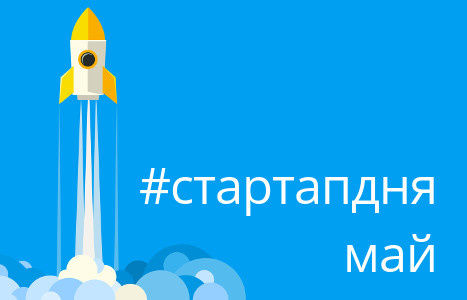
Continuing the series of Startup of the Day digests, today I present the most interesting projects for May. If you want to get acquainted with the rest, then I ask in my blog. Entries are available on Facebook , ICQ and Telegram .
1. WayUp
American variation on the topic of job search for millennials - WayUp startup. Everything is basically the same as in the good old Headhunter: there are jobseeker profiles, there are job advertisements, both sides can search each other by filters, money is taken from employers, everything is free for candidates.
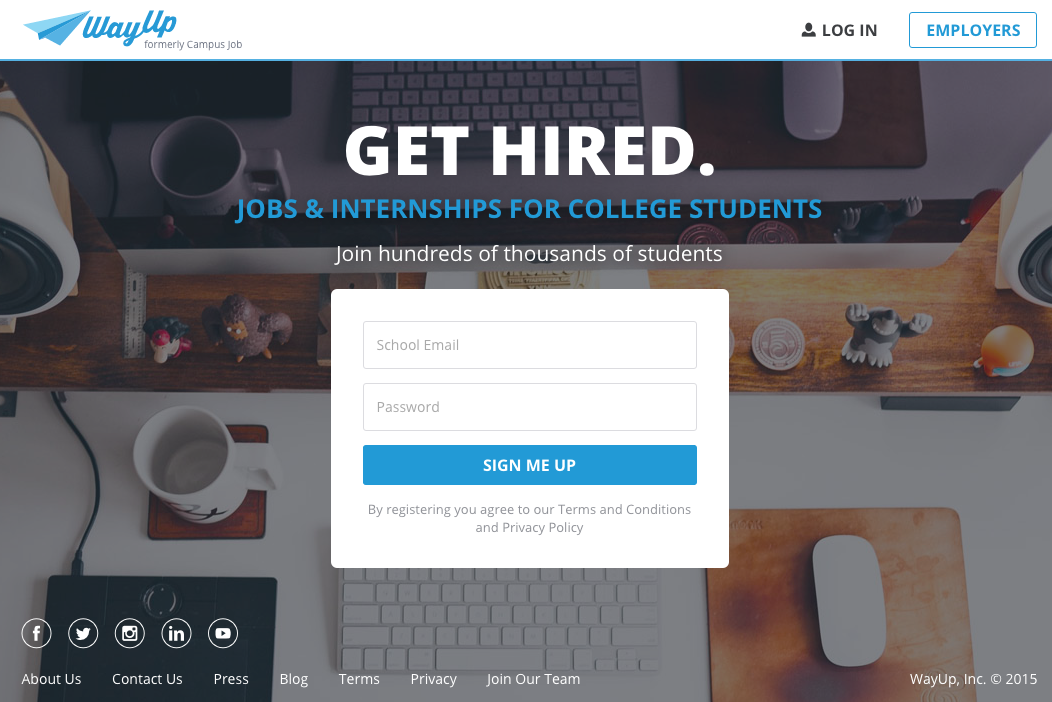
The first difference from the classics is specialization in students and graduates. No one has significant work experience, which, of course, significantly limits the range of potential vacancies, but selection by formal criteria works better: suitable universities and the average mark can be put in the filter, but there’s nothing more in the resume, no field for the subjective I do not like". Yes, in many respects this is the advantage of the selected category, and not the service, but who will figure it out - the percentage of suitable candidates among the proposed WayUp is high, HRs are happy, the startup boasts.
The second point is the hipster interface. There are standard filters, but they are hidden, the main element of the UI is the vacancies “specially for me” selected by smart algorithms, you don’t need to look for anything, you just need to click. This again reduces the failure rate, the algorithm is not as optimistic as a person, and chooses where there are more chances to get settled, and not where they pay best.
WayUp takes money for a subscription, before they tried to take for a candidate, but in the end they changed the model to a more familiar one. The investment project raised $ 27.5 million, of which 18.5 - the other day. It is curious that for an unknown part of the "old" nine he managed to buy a competitor clone.
2. MasterClass

Do you want to learn acting? Probably not. Do you want to learn acting through the Internet? Obviously not. And if via the Internet, but with Dustin Hoffman? And for only $ 90? This sentence seems to be much more interesting.
This is how MasterClass works. He finds stars of the first magnitude in some disciplines that are not vital, but pleasantly interesting to almost anyone: besides Hoffman, these are Sirena Williams in tennis, Christina Aguilera in singing, Gordon Ramsay in cooking, and writes a series of video tutorials with them about secrets mastery. Access to the lessons is sold for the very same $ 90 (part of them, of course, goes to the teacher), in addition to the video, the student receives homework and cross-checks by other students. Yes, in 2017 you can set and check homework even in tennis - you just need to record your movements on video, and then upload to the system.
The star checks some of the lucky assignments, their mistakes are publicly reported for all students - this increases the amount of content in the course, and creates some kind of lottery motivation when buying, “suddenly the Siren will look at me too!”
Courses are added to the system slowly, now there are only fourteen, a year ago there were seven, two years ago - five. Based on the dynamics of previous investments, it turns out that the cost of producing commercials and a one-time star fee is somewhere around a million and a half dollars per course, and the last round of $ 35 million will be enough for 25 new topics.
3. Tagged
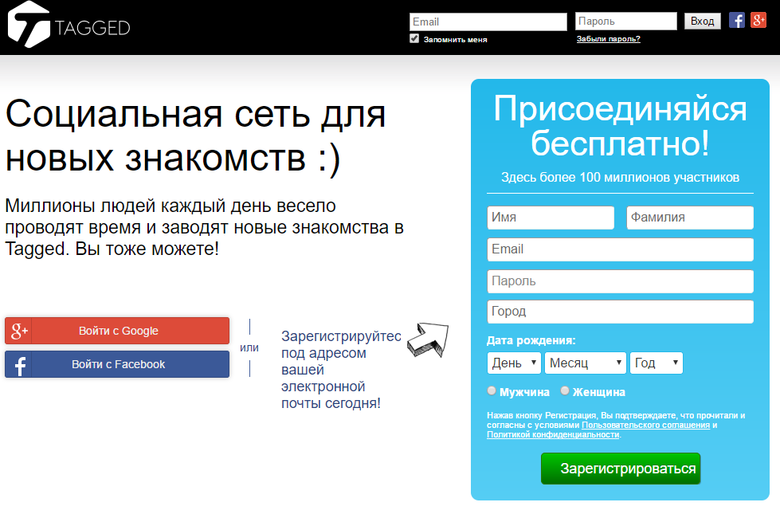
The startup Tagged itself is completely uninteresting. This is an old dating service, something like our lady.ru from the beginning of the zero (or the end of the nineties? ..). Mambo-like mechanics are combined with simple games, now something else like Tinder has been added nearby, everything is weighed-outweighed by advertising and paid features, but its users are there and leave their money, the project has been profitable for ten years. There are many such people on the network, dating is an eternal topic, and the existence of a leader does not kill the chance for outsiders to survive. However, everyone would be such outsiders - their revenue is about $ 50 million a year, the topic is not only eternal, but also rich.
It is interesting that Tagged conducted an experiment that at least once wanted to be carried out, probably by any large company. They reasoned simply: once every few years a student comes up with some awesome social thing and a new Facebook-not Facebook comes out, but at least Foursquare, worth hundreds of millions, and bringing more fame than our clone of a lady.
We are smarter than any student, we have more resources, we have experience in attracting traffic, we have loyal users who can be interviewed or used for testing. Let's start making new and interesting things ourselves, we will do better than students, and at least once we will guess, but this time it will pay off any efforts.
And they really did it, only before public use came two of their own products with original mechanics (a social network for neighbors and a nice messenger) and bought another multimedia messenger at an early stage. Nothing took off, of course ... But they tried it! All the rest dwell on the fact that a million students are trying, one succeeds, but they are not a million times smarter and more effective than each individual experimenter.
Now the fuse is over, the founders sold the company, then it will simply bring money to the new owners, the world has not been turned upside down.
4. Upskill
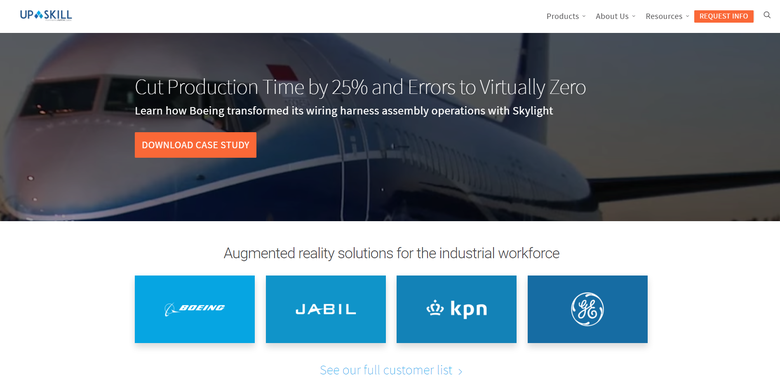
In the mass consciousness, augmented reality is often something like cool stickers in ICQ or Snapchat. Startup Upskill uses technology in much more serious matters, it is trying to increase the efficiency of workers. The main scenarios for its use are not so many, but each of them is obviously useful to entire industries:
- Online instructions: when you hover over a barcode Google Glasses or a similar device can tell you what to do with it and how to be.
- Online consultations: if someone less experienced is away, he can stream the video to someone more competent, but sitting at that moment in a comfortable office.
- Online task manager: the next task can literally flicker before your eyes, and the place of its execution or the details necessary for it can be highlighted somehow.
Formally, all this can be done with a mobile phone, but, firstly, it doesn’t look so stylish, and secondly, workers often need both hands. Therefore - glasses, not just Google, but any similar ones. It is clear that the real requirements of any customer for such products are absolutely unique, Upskill has done something like a framework that allows you to quickly implement these requirements. And it works. Among satisfied customers, for example, Boeing, whose glasses were able to implement so well that he even invested in a startup in the last round. In general, the future is drawing near.
5. Carvana
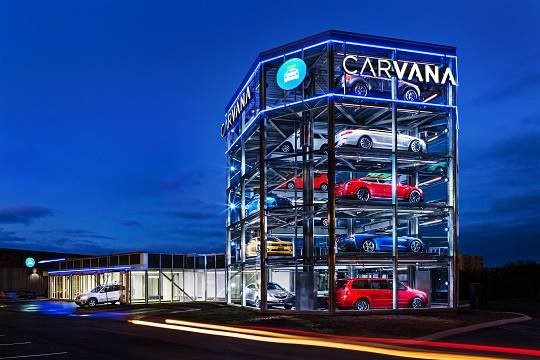
And in almost pure offline, there is life - Carvana startup has reached its billionth IPO. The result is not the loudest in world history, but in any case is excellent for a company four years old.
To understand the reasons for this success, you first need to go to a large salon to any major car dealer. It is almost always a huge glass palace, standing on some good land, in the city or near the city, and standing approximately a fortune. Such storage is especially expensive for used cars: after all, they must be kept there, it is impossible, as with new ones, to show dozens of buyers the same sample, and to sell other identical copies from a distant warehouse.
Carvana's business model is to compete with conventional dealers (essentially being a dealer), but abandon traditional giant salons and sell used cars over the Internet. Part of the money saved is put in the pocket for future profits and investor happiness, and part of the startup is shared with users, providing additional benefits in return for the lost opportunity to wander among the cars sold.
It all starts with limitless choice. Now the site has 7,000 vehicles available to every resident of the delivery zone. This, of course, is a little compared to any bulletin board, but much more than the dealer can offer in his salon. You can get inside each car with the help of a beautiful 3D model on Flash. 2017th year, startup, Flash - the combination looks a little strange, but on any auto.ru there will never be such a thing.
When the car is selected, the time comes for convenient delivery, it should not be worse than a regular dealer. The most mundane, but effective option - a car can simply be brought to the house. The second option is more exotic - Carvana pays a non-resident buyer a plane ticket so that he himself gets to the warehouse, sat down and left. And finally, the startup’s calling card is car vending machines: they’ll deliver the paid car to this tower, they will send the code to the new owner, he will come with a friend or taxi, enter the code and leave already behind the wheel of his new car.
There are only two such vending machines in the country, this is clearly not a very significant delivery method in terms of volume - but how beautiful it is! And in the press they always put their photos, and so I could not resist.
A man chose a car via the Internet, got it, say, in a vending, without talking to any living soul - naturally, it’s scary, suddenly the car was killed, although it was written that it was in perfect condition. To not be scared, Carvana gives guarantees. Firstly, I didn’t like the seven-day moneyback without any conditions - you can return it. Secondly, a one-day guarantee for any emerging flaws: if suddenly the engine itself flashed on itself, it would be a Carvana problem, not a buyer.
You can sell cars through the Internet, but prices will not be the best, and this is not a very popular option. The main source of cars for Carvana are B2B dealer auctions and similar old school tools. The startup’s economy isn’t converging yet; it has already learned how to profit from each car sold, but it doesn’t pay for the general expenses. However, the annual sales growth is about 300%, the effect of each sale is also improving, a couple more years - and the company as a whole should become profitable. In 2016, about twenty thousand cars passed through Carvana, the startup’s capitalization is now $ 1.7 billion, and $ 300 million was invested in the company before the IPO.
